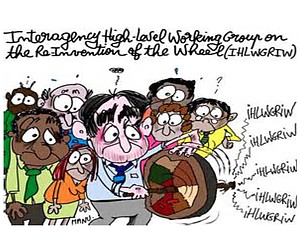Originally published 8/18/2017 at 09:24p.m., updated 10/21/2022 at 10:10p.m.

I firmly believe that the health of African Americans is dependent on the health of All Americans and that the health of all Americans is dependent on the health of African Americans. One of the strengths of the former Congressionally mandated Center for Research on Minority Health (CRMH), as well as its Achilles Heel, was the fact that it tried to address the health of all American. Focusing primarily on the underserved, it built its efforts around its Community Relations Coordinators (African Americans – Kelly Hodges); Asian Americans – Dr. Beverly Gor; Native Americans – Cheryl Downing; and Hispanic Americans – Angelina Esparza). Although we did not have a specific Community Relations Coordinator for the poor or rural Americans, their issues were always front and center. CRMH was a multi-disciplinary with the community always at the center of what it did. Again, this was our greatest strength and our greatest weakness. Focusing on the community truly allowed us to come up with unique and sustainable solutions. These solutions have survived for almost a decade since since it closed it doors? However, by not approaching a specific racial/ethnic group created funding issues. For example, when we approached one government agency with a grant they clearly wanted to fund, we were given a choice, focus on one population or not be funded. You know what we decided. It was better to have something than nothing. And what we learned, we passed on to those grantees working on other populations. And I will let you guess about whether we focused on only one population.
Today, because of the renewed interest in health disparities/inequities, there are many more groups popping up to address this issue. The problem is that there are many more groups popping up to address this issue, creating more and more silos. To me, this continues to be one of the major threats to addressing the issue health inequities, the continued need to reinvent the wheel and the need for someone to be assigned credit. Which leads to the question, do we really want to solve the issue of health inequities (http://stylemagazine.com/news/2018/jan/21/lovells-food-thought-do-we-really-want-successfull/)
I just saw another organization being created to hold another meeting to address the issue of health. My first thoughts were, “Why are they doing this? What is the real reason(s) behind this effort?” I am not asking these questions because I have seen or tried everything; I have not. But being at this for almost forty years, there are very few things I have not seen and/or tried. My next thought was what were they trying that was new? From my review, I can safely say that what they were trying I have seen this and tried it more than once before.
So, my question to any group addressing this issue or any other issue is, have you surveyed to see what is out there? If so, is the group and/or organization still around? If they are, find out why have they been successful or not in addressing the issue? If they have or have not so far, is there a need to form a new organization? If so, why? Can an alliance be formed with the organization(s), bringing your strengths together? If there is a need to create something new after going through this exercise that is great. However, if there is not a real need, forming such new group(s)/organization(s) may do more harm than good.
COVID-19 continues to demonstration the failure by society to address health inequities appropriately and with a true moral and ethical conscious. It does not mean we should not highlight our successes and celebrates them. but we need to be just as vocal about our failures. It is our lack of balance that will continue the shame of the avoidable mortalities.
And finally, think about this, creating more slices to a pie does not necessarily increase the number who can be fed at the table.
